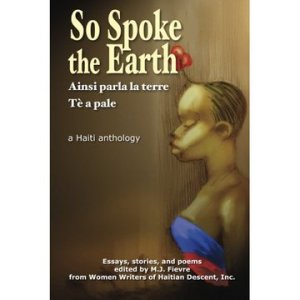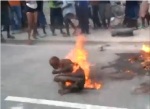Liliane Louis and M.J. Fievre were interviewed by Nick Lawrence about the SO SPOKE THE EARTH reading at the 2012 Miami Book Fair International.
Mireille Sylvain-David: L’été à Miami
Nous revoilà en plein été, entre soleil et pluie.
Le ciel parfois gris de nuages nous apporte ses pluies torrentielles
Pour nous rappeler que nous devons modérer nos élans.
Le ciel ensoleillé nous apporte d’étourdissantes chaleurs et le saphir de l’océan
Pour nous rappeler que nous brûlons d’énergie, tout en tempérant nos enjambées.
Ainsi va la vie avec son ébauche grise et ses ondes ensoleillées,
Le défi est de savoir comment jumeler et dissocier les caprices de la nature
Et jouir des esquilles de l’Eté à Miami, entre soleil et pluie.
***
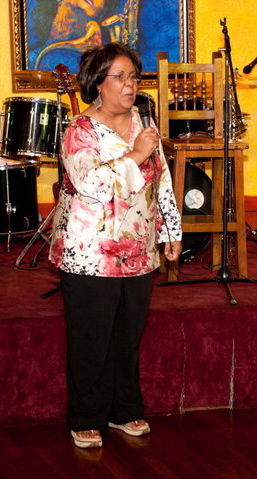 MIREILLE SYLVAIN-DAVID is the daughter of Marcel L. Sylvain, Haitian playright/dramaturge (1910-1987) who authored famous 1946’s play “Loccocia” and polular song “Haiti.” Mireille, who is also a poet, has published two novels: “Il Faut Sauver Elizabeth” and “Pures et Troublantes Vérités.” According to Mr. Joseph Thevenin, Mireille “breaks with the linearity of the romantic novels. […] Her artistic writing talent suggests and requires from us an infinite prolongation of thoughts.” Mireille Sylvain David is a pillar of the Haitian–American community, providing the initiative for the founding of HAYO (Haitian American Youth Organization of Kendall). She also publishes a monthly newsletter that addresses issues faced by our people.
MIREILLE SYLVAIN-DAVID is the daughter of Marcel L. Sylvain, Haitian playright/dramaturge (1910-1987) who authored famous 1946’s play “Loccocia” and polular song “Haiti.” Mireille, who is also a poet, has published two novels: “Il Faut Sauver Elizabeth” and “Pures et Troublantes Vérités.” According to Mr. Joseph Thevenin, Mireille “breaks with the linearity of the romantic novels. […] Her artistic writing talent suggests and requires from us an infinite prolongation of thoughts.” Mireille Sylvain David is a pillar of the Haitian–American community, providing the initiative for the founding of HAYO (Haitian American Youth Organization of Kendall). She also publishes a monthly newsletter that addresses issues faced by our people.
On peut être un homme sans être un savant
Envoyé par M. Frantz Voltaire.
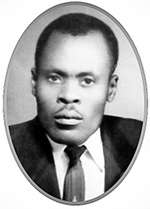
Haiti : Quand un artisan se fait batisseur d’humanité
Paroles prononcées par Gotson Pierre le 2 juin 2012 au Parc du Souvenir lors des funérailles de son père Pressage, décédé le 25 mai. Document soumis à AlterPresse.
Voici un homme qui a su suivre son chemin à travers les méandres de la vie, jusqu’à la mort. Avec pour boussole, le don de soi, l’honnêteté et le sens du progrès.
Pressage Pierre, mon père, est un jeune artisan, qui arrive à Port-au-Prince dans les années 50, après avoir laissé Leogane, sa commune natale.
Il nous raconte toujours des moments passés comme apprenti, puis ouvrier dans un atelier de confection à la capitale. Il a gardé jusqu’à la fin de sa vie un dé à coudre qu’il a conservé comme un précieux souvenir. Et aussi, un certain sens de l’élégance.
Mais c’est avec la coiffure, qu’il va faire sa vie et prendre ses responsabilités familiales.
Coiffeur de référence durant les années 70, 80, il a longtemps partagé son salon à la Grand’rue avec un frère, un cousin et des proches.
Pour avoir été ce coiffeur qu’il fut, dans un autre contexte que celui d’Haiti, il aurait certainement gagné beaucoup d’argent et de notoriété.
Par la qualité de son travail, il avait bénéficié du respect de ses pairs et de ses clients. Des gens de toutes les couches de la société se faisaient couper les cheveux par “François”, tel qu’il était surnommé.
Gens ordinaires, artistes, diplomates, ministres… ont eu à baisser la tête devant mon père. Oui, je me souviens bien de cette phrase que j’entendais souvent lorsque j’étais de passage au salon de coiffure : “baissez la tête”. Ces mots sonnaient comme une injunction et le client n’avait pas d’alternative.
À cette époque, que de collègues de Pressage ont laissé le pays. On nous disait que être coiffeur à New York, ça rapporte. On avait les nouvelles d’un tel. On voyait même des photos de celui-ci appuyé sur le capot d’une grosse voiture américaine. Signe de réussite.
Papa n’a pas voulu partir. Il était convaincu que sa place était auprès de ses enfants pour leur fournir l’encadrement nécessaire à leur épanouissement, dans une capitale aussi imprévisible que Port-au-Prince.
Il est donc resté. C’était son choix. Il en a tiré les conséquences.
Vivre ici. Côtoyer des dignitaires sans jamais épouser leur idéologie. Garder sa lucidité et son indépendance d’esprit, même au cœur de la barbarie. Des témoins rapporteront ces échanges intenses au salon de coiffure du 683 Boulevard Jean Jacques Dessalines. Malgré les espions qui rodaient…
Éviter la corruption, opter pour l’honnêteté et la foi dans le travail. Que de possibilités pourtant de gonfler sa tirelire et d’accumuler abusivement des biens ! Non. Ce n’est pas ce genre d’héritage qu’il faut laisser aux générations futures.
Pressage croyait en l’éducation pour l’ascension sociale et la modernité. Il faut aller à l’école. Il faut étudier. Et sur ce dossier, pas de négociation. D’ailleurs, ses enfants n’étaient pas les seuls à bénéficier de son dévouement lors des démarches de rentrées scolaires…
Après une journée de travail, nous faire réciter. Moment terrible. Car toute imperfection est impardonnable. Quelle sévérité !
J’ai compris longtemps après. Longtemps après être entré en rébellion contre toute forme d’autorité y compris l’autorité paternelle. C’était au milieu des années 80.
Durant cette période aussi, j’ai vu pour la première fois des lueurs d’inquiétude dans les yeux de papa. En particulier, que son premier fils puisse exprimer publiquement sa vision critique du pouvoir et s’exposer à la foudre des puissants de l’époque, il ne pouvait pas l’imaginer ! C’était pourtant le résultat de ses propres enseignements.
À la fin de sa vie, il ne cachait pas cependant sa satisfaction d’avoir transmis le goût du travail, de la connaissance et le sens de l’honnêteté à ses descendants et descendantes.
Il savait que bâtir des esprits, c’est construire les sociétés de demain.
C’est en essayant de synthétiser cette personnalité que mon frère Duwalph et moi avons écrit ce que vous pouvez lire sur le signet (distribué au cours de la cérémonie) :
Être
Contribuer à sa manière
Jusqu’à son dernier soupir
Au bonheur des autres
Et au progrès du monde
On peut être un homme
Sans être un savant
Mi Espejo
Message de Claude Sainnécharles:
Bonjour à tous. Je tiens à partager, avec beaucoup de plaisir, l’illustration réalisée par Marlen Guérin, aquarelliste-illustratrice canadienne, pour la traduction que j’ai faite du recueil de poésie Los espejos del tiempo (Les Miroirs du temps) de Guido Riggio Pou, écrivain poète, économiste et critique, de nationalité dominicaine.
***

Mi espejo
Encontraré mi espejo
más allá de la flor,
sepultado en el tiempo.
El mastica mi rostro,
mis días,
mis sueños.
Mon miroir
Je rencontrerai mon miroir
au-delà de la fleur,
enterré dans le temps.
Il mastique mon visage,
mes jours,
mes rêves
Dusable, Pirate son and City founder

Kwame: An American Hero
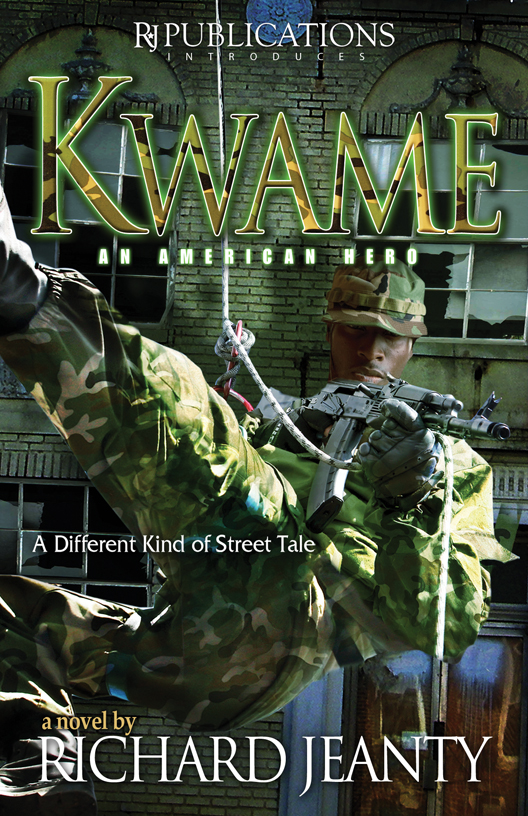
The Energetic Ralph Cheriza
Ralph Cheriza is the Chief Executive Officer of the Haitian Empowerment Foundation and a former news executive from Haiti. In 1987, Ralph emerged as a young journalist at Radio Lumière, Haiti’s Southern Baptist Church News Radio Network. Rather quickly, he was promoted to News Editor then Managing Editor of the prime time news edition. After the coup d’état, when Radio Lumière closed its newsroom, Ralph moved to Signal FM where he served as a News Executive who helped build the news team and establish the station as a credible news station.
During the de facto military regime, Ralph took a firm stand against the coup d’état. In his editorials, he faulted Haiti’s political elite for the debacle of the country. Thugs of the de facto military regime schemed attempts on his life which eventually forced him to seek refuge in Florida on May 20th, 1994.
In Palm Beach where he resides, Ralph has worked as a social worker and ran a successful evidence-based early literacy program until September of 2011.
On average, Ralph gives 10 speeches a year addressing statewide students’ conferences, professional associations, symposia, congregations, civic groups, fundraisers, and campus students clubs. Among other places, he has spoken at University of Pennsylvania, Florida International University, University of Central Florida, University at Buffalo, University of Florida, University of Miami and Palm Beach Community College.
A father of two, Ralph Cheriza holds a degree in journalism and political science.

WWOHD: What is the goal of the Haitian Empowerment Foundation?
Ralph Cheriza: The Haitian Empowerment Foundation was established in 2004 as a nonprofit organization to provide “wide ranging resources” to Haitian students with unmet needs. The organization strives to be a “sustainable organization” able to meet various needs of the community.
The organization recently expanded its mission to include a “Haiti project” that addresses the need for quality education and disaster awareness. The organization is raising money to build disaster proof state of the art community schools on donated land in rural areas and called for a new and innovative curriculum that meet societal needs.
WWOHD: What are some of the organization’s recent activities?
RC: The foundation hosted a Haiti Education Forum at Lynn University in June 2011 to brainstorm on effective strategies to transform Haiti’s school. A report on that forum was released to the public at the organization’s gala on June 9th, 2012.
The foundation hosted a series of group trauma counseling session to assist victims in coping with the aftermath of the earthquake.
The foundation assists students of unemployed Haitians and survivors of the earthquake with book bags, school supplies, haircuts, physicals . . . to facilitate their return to school. Since its inception, the foundation has awarded $30,000.00 worth of scholarships to deserving Haitian students.
WWOHD: When you’re not working on achieving the Foundation’s goals, what are your hobbies?
RC: [Laughs] Good one. I read and write. I am actually working on a book on my experience with the Haitian crisis. I enjoy moonlight walk on the beach, poetry and movies.
WWOHD: You are located in West Palm Beach. Tell us about the regular educational and cultural activities geared toward the Haitian community there (not only the Foundation’s activities, but other regular events as well)
RC: The school district of Palm Beach County hosts a Haitian heritage month in May where activities are held to showcase Haitian heritage and culture.
Sunfest is the largest waterfront festival in Palm Beach county hosted annually during the first week of May. A Haitian band is always featured.
Lilian Cotton: A Slow Battle

A Slow Battle
Oil on Canvas
2008
18” X 24”
By Lillian Cotton
The artist in her own words:
I was born in Lithia Springs, a suburb of Atlanta, GA and spent most of my childhood in various cities in the north and southeast. I attended a magnet art school for visual and performing arts; concentrating in painting and drawing. During high school I attended the South Carolina Governor’s School for the Arts and Humanities. In 2008 I received a B.F.A in Painting and Drawing from The University of the Arts in Philadelphia, PA. In that same year I received the Rohm and Haas Fine Arts Achievement Award.
Since graduating from college my work has been shown at various venues and charity events in Philadelphia, notably the 2010 Battle of the Canvas (an event which promotes art that affects and influences social change). I participated in Adopt–a-Pig, a fund-raising event to help children with cancer. I also participated in a second two-person show called “Four Women” (inspired by Nina Simone’s Song by the same name) at Vivant Art Collection in Philadelphia, PA. In September 2011 I relocated to South Carolina and continued my work with community projects. In collaboration with HEART ministry we completed “Project Valentine of February 2012,” an effort that presented gift baskets to women in shelters who had suffered abuse.
The concept of my work emanates from summer vacations spent in South Carolina with my extended family; particularly my grandparents and cousins. As fashion- conscious teenagers we spent a great deal of time shopping, sharing beauty secrets, and styling and braiding each other’s hair. I enjoyed immensely the creative aspects of hair styling
while pursing my main passion for drawing and painting and began collecting books and magazines on the subject.
During my undergrad years I became more socially, culturally, and politically conscious and my new awareness had a profound effect on the subject and theme of my art work. I studied women, especially African-American women and their attitudes towards coiffures and how they used it to define and make bold and interesting statements about themselves. I began to paint women, focusing on their hair and using it as a means and tool to portray their wealth, identity, social class, ethnicity, religion and sexuality.
While well-groomed appearances, especially hair, have always been an indication of social class, wealth, and prominence; unkempt hair has been a marker of poverty, derangement, and low self-esteem (stemming from various forms of negligence and abuse). It was from that moment of realization that I began to infuse the concept of women’s perspective of hair, with all its implications, into my paintings thus allowing the condition of her hair to non-verbally speak of the state of her mind.
Visual, decorative, and figurative abstractions best describe my work. I love patterns; particularly, African wax print fabric and lace. However, I am also highly influenced by graffiti, Abstract Expressionism, and the Art Nouveau era.
Pascale Doxy: Sa w’ap gade la-a?
Sa w’ap gade la-a?
Bra ki rache?
Je ki pete?
Tèt ki kraze?
Fanm k’ap trepase?
Yon moman ki brote vant mwen ale?
Ki foto w’ap pran la-a?
Ou klap! klap!
Ou voye youn nan Nò
Yon lòt nan Sid
Pòtre m’ fè letoudimond!
Yon ti vè diven nan dyòl ou
Pye w’ sou yon ti chèz ba
W’ap dèz kò w’
Mizè moun se yon bèl woman
Van soufle dife
Dife fè flanm
Flanm propaje
Flanm rive devan pa pòt ou
Ou gen estenktè?
Yon milyon diskou
Kostim ak brezo pou sove Limanite
Donasyon adwat gala agòch
Adopte se solisyon
Any! W’ap metrize lodyanz konsyans ou!
Men Dyab!
Latè se adrès pa w’ tou!
Dlo, Van, Dife ak Tè
Se istwa pa nou tout!
Bann foto sa yo w’ ap gade la-a,
Siman se
Imaj ou….
Lavi w’…
Demen w’…
***
Pascale DOXY is an artist born and raised in Port-au-Prince, Haiti. While working as both a teacher and a school administrator in the Caribbean country, she managed to write several books for children grades 1 to 11: Guides de Savoir-vivre.
Following the 2010 earthquake, Pascale moved to Florida, where she has showcased her paintings and poems about the tragedy. She is currently planning other exhibits and looking forward to publishing her children and young adult stories.
Click here to read another poem by Pascale and here to appreciate her visual art.
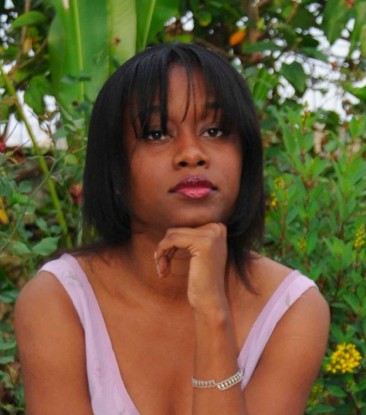
Pascale Doxy
Meet Ayiti
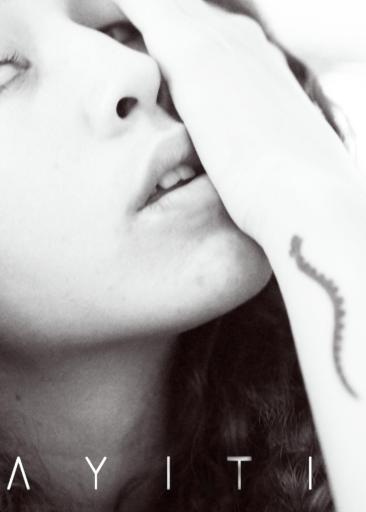
The talented artist of Haitian descent, Ayiti Coles, talks about her roots, her singing career, and all of her influences.
Who is Ayiti Coles?
I’m 19 years old. I consider myself a real artist at heart whether it’s singing, writing, drawing, photography… I’m laid back, silly, a bit of an airhead and quite impatient. I always try to stay open minded and really think it’s important not to judge anyone or anything.
Where did you grow up?
I was born in Paris, but I’ve considered Haiti my home ever since I arrived there at the age of rwo. Got there as a toddler and never left!
I’m currently studying International Development in McGill University, so I’ve been in Montreal for about a year and a half now. It’s the first time I’ve left Haiti for more than just a few months. Montreal is a great city but, to be honest, I do miss home—my family, the food, the culture, the SUN. Winter is so long here! Haiti is home to me and nothing could ever really take its place in my heart. Lakay se Lakay.
Tell us about your post-earthquake experience.
Personally, I was lucky enough that my family was unharmed; we only lost the house. I will always say it: I was part of the lucky bunch. I was in my senior year at the Lycee Alexandre Dumas when the earthquake happened, and even though school stopped for a month, I stayed and passed my French BAC and graduated there.
The earthquake was really a terrible thing to live through. There was so much loss: human lives, entire homes—all gone in 38 seconds. And then, there the exodus: in the weeks after the earthquake, you could see big buses packed with people heading back to the provinces. Most of my friends and classmates left the country. To give you an idea, by the time school had reopened, my class had gone from about 60 to 15 students.
The song Ghost Town is about this whole experience. To be honest, I felt left behind, and very alone for the first month after the earthquake. I had seen life as I knew it change completely before my eyes, in less than a minute, my hometown turn into rubble. Almost every body I cared about had left and I had no one my age around for a while. One day I went to pick up something at my cousin’s house, which is at walking distance from where I was staying. This was a residential neighborhood where many people I knew lived, yet as I was walking, no car passed by, just one lonely motorcycle. It felt so empty. Then when I got to the house, it was empty as well. My cousins had left to Florida the week after the quake, but I could tell that everyone had just abandoned the place without looking back. There was a dirty plate on a table, beds undone, clothes in the hampers, a light on. Everything was left as is, abandoned. I stood there and thought, “this is what most houses in Port-au-Prince must be like at this moment.” I realized the city had turned into a Ghost Town.
That’s where the idea for the hook came, and the rest of the song is just all about the same feeling of living in an empty, destroyed city. It was a sort of therapy for me to express what I believe anybody living in Port-au-Prince at that time would feel. Poor, rich, black, white, we were all in the same boat. It was a dark period for anyone even remotely Haitian and I still get emotional when thinking about it.
In “Ayiti—In a nutshell” you mentioned your Latin roots and also your French roots. Tell us a little bit more about your ancestry and how you embrace it in your music.
On my father’s side, my grandmother is French and my grandfather Haitian, while on the maternal side, both grandparents are Chilean. My father grew up in Haiti, and his side of the family lives there. As for my mother, her parents have been living in Paris for about 40 years now. I used to visit my Chilean family in Paris every summer, which brought me closer to both French and Chilean cultures. You could say I learned to speak Spanish by listening to my grandmother and my grandfather talking one another in Spanish, while taking strolls in the Jardin du Luxembourg.
As for how I embrace this in my music, I don’t really try do anything in particular. I believe it shows through naturally, as it’s all a part of me. I’ve contemplated writing songs in French and in Spanish. I actually write prose in both languages and for now it’s only prose, but who knows? Maybe down the road it can become a song.
Tell us about your singing career. How did it start? Have you recorded any single? Any album?
One of my first souvenirs of singing is the Christmas carol show when I was about 5; I had a solo in “Petit Papa Noel.” Also, I participated in two out of the three school plays that were produced at my high school. In 8th grade I was lead in the Emilie Jolie musical. However, my decision to pursue music came after the earthquake. I always knew I wanted to be a singer, but I was always shy about it. In 2010, my perspective on life changed. I realized we have to go after what we want, even if it means deviating from the traditional path. I decided I didn’t want to waste any more time being afraid and had to pursue my passion and give it my all. In the fall we recorded about three songs, including Ghost Town, and ever since then I’ve recorded about 7 more. Technically I almost have an album, though I’m not quite ready to put it out yet. I’m still figuring out whether to add or alter tracks.
What place does music hold in your life?
Music and I go way back! My dad used to sing me to sleep a lot when I was a baby and I believe I’ve been singing pretty much ever since I could talk. Not a day goes by without me singing, or trying to write some lyrics. Music is pretty much everywhere in my life.
How would you describe your style?
As an artist I have many influences. I love different genres of music. Bands like Fall Out Boy and Paramore have marked my early teens and then I grew into liking house music, DJs like Steve Angello, Richard Grey and Avicii. I’m also a huge fan of Lady Gaga, Lana del Rey, Florence and the Machine and Fiona Apple. It’s not easy to incorporate all of these influences in my music but again: it’s a part of me, so I believe that it will show through naturally. As for now, my style is somewhat “alternative.” It’s a mix of bluesy alternative-rock and electro-pop.
Do you come up with the music or the lyrics for your songs first?
I usually write the lyrics first. Once or twice did I put lyrics to a melody but it’s usually the words that come first. It’s very important to me that the lyrics are mine. I don’t want any one to speak for me, or to sing someone else’s emotions. I believe it’s part of the job to be able to express your feelings and beliefs in your art. As for the composing, I’m still learning and growing as an artist, so I’ve had some great producers help me put melodies to my lyrics, but my goal is to ultimately do it all, from the words to the song.
Do you play any instrument?
I took about six guitar classes with a private teacher when I was in middle school, but I disliked it. Patience isn’t my strong suit and learning and instrument requires a lot of it. He showed me a few basics but apart from that I’m self-taught. I practice often, I’ll get the hang of it.
What is the hardest part for you in terms of creating a song?
The hardest part for me would be melodies. I mentioned already that I’m still a little bit green at composing a melody, but as time passes I’m getting more familiar with the creative process, and understanding how things work. In one year I’ve already gotten more confident and I participated in the composition of two of the latest songs I’ve written.
When I google Ayiti Coles, an athlete (horse rider) comes up. Is that you? If yes, tell us a little bit about that.
Yes, that’s me! I used to be very serious about riding. I’ve represented Haiti abroad on several occasions, including at the Panamerican Games for young riders, in 2005 in Chile, where I made it to the finals, and in 2006 in Argentina. I’ve also competed in Guatemala, and placed 3rd on the first day of the competition. I also competed in Germany and West Palm Beach USA many time. Riding was a great experience, and a great school of life. In this sport, you’re not alone, it’s all about your communication with the horse and how you build a trusting relationship with it. There’s a lot of discipline and responsibility that come with it: taking care of the horse, of the equipment, being dressed properly for the competitions etc… so it forces you as a child to show maturity and a sense of responsibility. I’ve stopped riding after the earthquake because I had to focus on graduating, and now I’ve chosen music, but it’s still something I love to do as a hobby whenever it’s possible!
